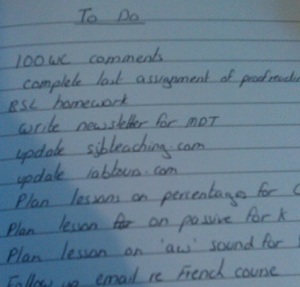Recently I signed up to a blogging challenge and one of the suggestions was to write a blog post about a typical day. That sounds all well and good…..except that I don’t have a typical working day!
Often I have work booked in in advance, which is great. On those days I get ready for work and I go. Other days I wait to see if the phone rings. Most days it does and off I go to work. Other days it doesn’t and then I work from home.
But, whether the phone rings at the last minute, or the day is booked in advance, the work I do when I get there is the same though – right? Er…no! I teach across a whole range of ages, and teach every subject on the primary curriculum as well as specialising in languages. One day I could be playing dolls houses and making chocolate crispie cakes in Nursery; the next teaching French to graduates at a local university. The day after that could be a 1960s themed day with Year 6, followed by a day split between Years 1 and 2 doing some Latin. The week could end with a day teaching deaf children.
 On those days when I work from home the days are still varied. I maintain my own website and this blog, and also have responsibility for my husband’s website and blog for his tour guiding business. There are always emails that need answering and I sometimes proofread my husband’s translation work for him. I’m part of Team 100WC so I make sure I find time to read the children’s writing and leave comments for them.
On those days when I work from home the days are still varied. I maintain my own website and this blog, and also have responsibility for my husband’s website and blog for his tour guiding business. There are always emails that need answering and I sometimes proofread my husband’s translation work for him. I’m part of Team 100WC so I make sure I find time to read the children’s writing and leave comments for them.
I also take my CPD seriously, so a work from home day will include doing my homework for my British Sign Language level 3 course and reading and research for a level 3 course in Dyslexia Awareness, Support and Screening.
Four evenings a week and Saturday mornings I do private tuition for children aged 6-12, but again every lesson is different. Some of the children I work with need help with just maths, some just English and some both. Some have dyslexia and need a different sort of help, and some find the work they do at school easy and need stretching. As if that wasn’t enough variety, I am planning to branch out into 11+ tuition, and language teaching for businesses as well.
So – thanks very much to Nikki Pilkington for the suggestion in her 30 Day Blogging Challenge, but I’m afraid this is about as typical as it gets!

